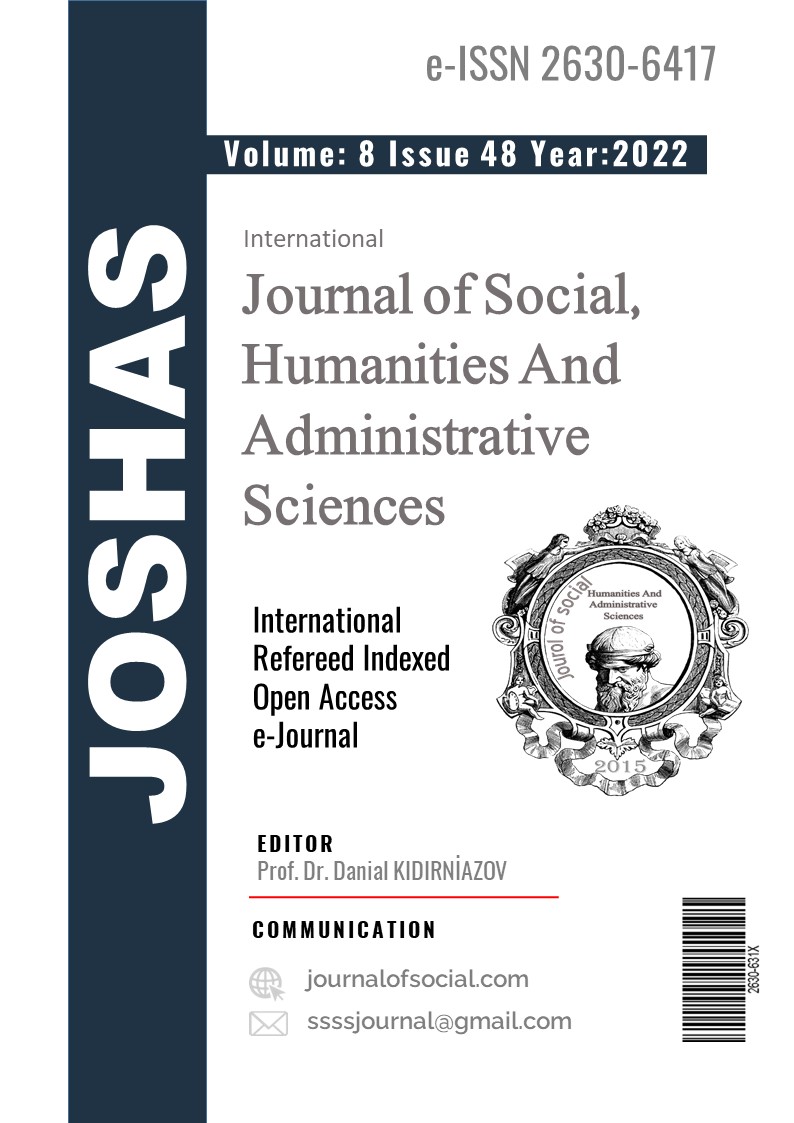Author :
Abstract
Sosyal sermaye tüm ülkelerin ortak noktasıdır. Birçok ülke, toplumlarında bir güven ortamı ve güçlü ilişkiler yaratmakla birlikte politikacılar ve halk arasında güven yaratmaya çalışmaktadır. Sosyal sermaye, toplumlardaki güven düzeyi, normlar ve karşılıklı ilişkiler ile ilgilidir. Bu nedenle herhangi bir toplumda sosyal sermayenin düzeyini bilmek için bu toplumda ne tür ilişkiler olduğunu, hangi ilişkilere en çok önem verdiğini ve buna ne düzeyde güvendiğini bilmek gerekmektedir. Bundan hareketle, bu çalışma "Hangi sosyal sermaye türleri Japonya ve Türkiye için toplumsal ilişkilerin tanımlanmasında daha belirleyici olmaktadır?" sorusuna cevap vermeye çalışmaktadır. Bu soruya cevap verebilmek için Dünya Değerler Anketi üzerinden sosyal sermaye ile ilgili Japonya ve Türkiye arasında karşılaştırma yapılmaktadır. Bu karşılaştırma sonucunda, Türkiye'de sosyal sermaye düzeyinin Japonya'ya göre düşük olduğu tespit edilmektedir. Bunun yanında, Türk toplumunun aile ve dine dayalı ilişkilere önem verdiği ve yakın ve basit ilişkilere de önem verdiği için Türkiye için toplumsal ilişkilerin tanımlanmasında daha belirleyici sosyal sermaye türünün bağlayıcı sosyal sermaye olduğu tespit edilmektedir. Japon toplumunun ise aile ve yakın ilişkilere olan ilgisinin yanı sıra uzak ilişkilere önem verdiği ve dine fazla önem vermediği ve dolayısıyla ona dayalı ilişkilere önem vermemektedir. Bu nedenle, Japonya için toplumsal ilişkilerin tanımlanmasında daha belirleyici sosyal sermaye türünün köprü kuran sosyal sermaye olduğu tespit edilmektedir.
Keywords
Abstract
Social capital is the common point of all countries. Many countries strive to build trust between politicians and the public, while creating an atmosphere of trust and strong relationships in their societies. Social capital is related to the level of trust, norms and mutual relations in societies. Therefore, in order to know the level of social capital in any society, it is necessary to know what kind of relations there are in this society, which relations are most important and at what level they trust them. Based on this, this study tries to answer this question "Which types of social capital are more decisive in defining social relations for Japan and Turkey?". In order to answer this question, a comparison is made between Japan and Turkey regarding social capital through the World Values Survey. As a result of this comparison, it is determined that the level of social capital in Turkey is lower than in Japan. In addition, since Turkish society gives importance to family and religion-based relations and also attaches importance to close and simple relations, it is determined that the more decisive type of social capital in the definition of social relations for Turkey is binding social capital. In addition to its interest in family and close relations, Japanese society gives importance to distant relations and does not attach much importance to religion, and therefore does not attach importance to relations based on it. Therefore, it is determined that the more decisive type of social capital in defining social relations for Japan is bridging social capital.
Keywords
- Abdioğlu, H., & Yavuz, S. (2013). İşletmelerde Sosyal Sermayenin Ölçümlenmesi ve Raporlanmasına Yönelik Bir
- Abdioğlu, H., & Yavuz, S. (2013). İşletmelerde Sosyal Sermayenin Ölçümlenmesi ve Raporlanmasına Yönelik Bir Araştirma. Afyon Kocatepe Üniversitesi, İİBF Dergisi, 1, 25–56.
- Aslan, S. (2016). Türkiye’de Sosyal Sermaye Bileşenlerinden Güven Hakkında Bir Değerlendirme.pdf. Cumhuriyet Üniversitesi İktisadi ve İdari Bilimler Dergisi, 17(2), 181–204.
- Başak, S., & Öztaş, N. (2010). Güven Ağbağları, Sosyal Sermaye ve Toplumsal Cinsiyet. In Gazi Üniversitesi İktisadi ve İdari Bilimler Fakültesi Dergisi (Vol. 12, Issue 1, pp. 27–56).
- Devamoğlu, S. (2008). Sosyal Sermaye Kuramı Açısından Türkiye’de Demokrasi Kültürü Üzerine Bir Değerlendirme. Pamukkale Üniversitesi.
- Gerşil, G., & Keskin, R. (2018). Sosyal Sermayenin Güven Unsurunun Değerlendirilmesi: Manisa Celal BayarÜniversitesi İktisadi Ve İdari Bilimler Fakültesi Öğrencilerine Yönelik Bir Uygulama. Sosyal Bilimler Enstitüsü Dergisi, The Journal of Social Sciences Institute, 42, 155–178.
- Healy, T., & Sylvain, C. (2001). The Well-Being of Nations: The Role of Human and Social Capital. Education andSkills. Organisation for Economic Cooperation and Development. 2 rue Andre Pascal, F-75775 Paris Cedex 16.
- Kahraman, İ. (2016). Sosyal Sermayeyi Geliştirmeye Yönelik Etkinliklerin Öğretmenlerin Sosyal Sermaye Düzeyine Etkisinin İncelenmesi. Gaziantep Üniversitesi.
- Kangal, N. (2013). Sosyal Sermaye Teorileri Ve Sosyal Sermaye Kalkınma İlişkisi: Türkiye Örneği. Selçuk Üniversitesi.
- Karagül, M. (2015). Sosyal Sermaye ve İbn-İ Haldun’un Asabiyet Düşüncesi. In A. Diken, M. Erdirençelebi, H. A.Akyürek, & M. Y. Özsağlam (Eds.), 1. Uluslararası Uygulamalı Bilimler Kongresi: “Sosyal Sermaye” (pp. 1–11). Kültür A.Ş.
- Karagül, M., & Masca, M. (2005). Sosyal Sermaye Üzerine Bir İnceleme. Ekonomik ve Sosyal Araştırmalar Dergisi, 1, 37–52.
- Kaya, Y. (2011). Sosyal Sermaye Düzeyinin Belirlenmesi Ve Sosyal Sermaye Düzeyini Etkileyen Faktörlerin Analizi: Gönüllü Teşekküler Bağlamında Kayseri Örneği. Dumlupınar Üniversitesi.
- Keleş, H. N. (2012). Sosyal Sermaye. Eğitim Yayınevi.
- Keskin, M. (2008). Sosyal Sermaye ve Bölgesel Kalkınma: Erzurum Ticaret ve Sanayi Odası Üyelerinde Sosyal Sermaye Düzeyi ve Belirleyicilerinin Analizi. Atatürk Üniversitesi.
- Kılınç, Z. A. (2010). Yurttaşlık ahlakı olarak sosyal sermaye. Bilgi Sosyal Bilimler Dergisi, 2, 1–37.
- Koç, N. (2019). Sosyal Sermaye: Türkiye Açısından Bir Değerlendirme. Mehmet Akif Ersoy Üniversitesi Uygulamalı Bilimler Dergisi, 3(2), 338–354. https://doi.org/10.31200/makuubd.610492
- Şan, M. K., & Şimşek, R. (2011). Sosyal Sermaye Kavramının Tarihsel - Sosyolojik Arkaplanı. In Akademik İncelemeler Dergisi (Vol. 6, Issue 1, pp. 88–110).
- Şavran, T. G. (2018). Sosyal Sermaye ve Sağlık Arasındaki İlişki: Ampirik Çalışmalar Ne Gösteriyor? Journal of Economy Culture and Society, 57, 53–91. https://doi.org/10.26650/JECS413503
- Tabak, O. (2019). Sosyal Sermaye ve Bölgesel Kalkınma İlişkisi: Türkiye’de Düzey 3 Bölgeleri İçin Sosyal Sermaye Endeksinin Hesaplanması. Ege Üniversitesi.
- Uğuz, H. E., Örselli, E., & Sipahi, E. B. (2011). Sosyal Sermayenin Ölçümü: Türkiye Deneyimi. Akademik İncelemeler Dergisi, 6(1), 8–40. https://doi.org/10.17550/aid.94691
- Yıldız, Z., & Topuz, H. (2011). Sosyal Sermaye Ve Ekonomik Kalkınma İlişkisi Açısından Türkiye Üzerine Bir Değerlendirme.pdf. Sosyal Siyaset Konferansları, Journal of Social Policy Conferences, 61(2), 201–226.
- Yiyit, T. (2017). Sosyal Sermaye Kavramına Türkiye’deki Örgütsel Davranış Açısından Bir Bakış. Hitit Üniversitesi Sosyal Bilimler Enstitüsü Dergisi, 10(2), 1499–1520. https://doi.org/10.17218/hititsosbil.303694
